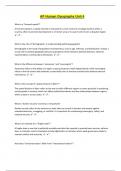AP Human Geography Unit 4
What is a "forward capital"?
A forward capital is a capital city that is relocated to a more central or strategic location within a
country, often to promote development in a frontier area or to assert control over a disputed region.
✔️✔️
What is the role of "demography" in understanding political geography?
Demography is the study of population characteristics, such as age, ethnicity, and distribution. It plays a
crucial role in political geography because population trends influence political decisions, electoral
representation, and boundary delineation. ✔️✔️
What is the difference between "autonomy" and "sovereignty"?
Autonomy refers to the ability of a region or group to govern itself independently, while sovereignty
refers to the full control and authority a state holds over its territory and decisions without external
interference. ✔️✔️
What is the concept of "spatial division of labor"?
The spatial division of labor refers to the way in which different regions or areas specialize in producing
certain goods or services, which can affect political boundaries and the relationships between regions
within a state or across states. ✔️✔️
What is "border security" and why is it important?
Border security refers to the measures a state takes to control its borders and protect against
unauthorized entry, smuggling, or conflicts. It is important for maintaining sovereignty, safety, and
national security. ✔️✔️
What is an example of a "fragile state"?
A fragile state is one that is politically unstable and lacks the capacity to provide basic services, enforce
laws, or maintain control. Examples include Afghanistan or Somalia, where weak governance leads to
internal conflict and insecurity. ✔️✔️
How does "territorial waters" differ from "international waters"?
, Territorial waters are areas of the sea within 12 nautical miles of a state's coast, over which the state
has full sovereignty. International waters, on the other hand, are beyond the jurisdiction of any state,
where ships and aircraft have the freedom to operate. ✔️✔️
What is a "multi-state nation"?
A multi-state nation is a cultural or ethnic group that is spread across multiple states, such as the Kurds,
who live in parts of Turkey, Iraq, Syria, and Iran. ✔️✔️
What is the concept of "shatterbelt" in geopolitics?
A shatterbelt is a region caught between rival superpowers or ideologies, where local conflicts or
tensions are exacerbated by the interests of external powers, such as the Middle East during the Cold
War. ✔️✔️
What is a "political economy"?
A political economy is the study of the relationship between politics and economics, exploring how
political decisions affect economic systems, and vice versa, which can influence state policies and global
relations. ✔️✔️
What is the significance of "cultural imperialism"?
Cultural imperialism refers to the dominance of one culture over others, often through media, trade, or
political influence, which can shape global political landscapes and alter local cultural identities. ✔️✔️
What is a "capital-intensive industry"?
A capital-intensive industry is one that requires significant investment in machinery, technology, or
infrastructure to produce goods, which often leads to the establishment of industrial zones or special
economic areas in certain regions. ✔️✔️
What is the "law of the sea" and why is it important?
The Law of the Sea is a body of international regulations that governs maritime boundaries, including
territorial waters, exclusive economic zones (EEZ), and the rights of coastal states. It is important for
maintaining order, trade, and resource management at sea. ✔️✔️
What does "geopolitical power" refer to?




